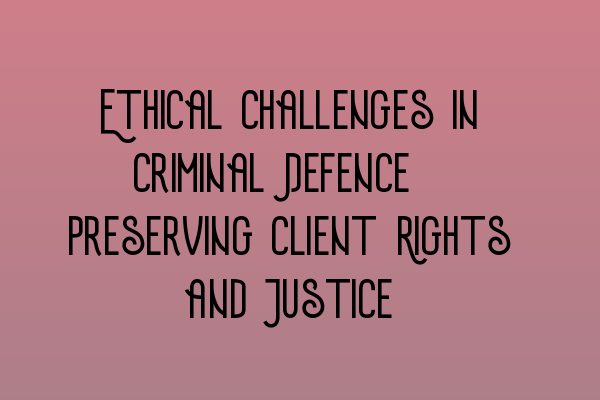Ethical Challenges in Criminal Defence: Preserving Client Rights and Justice
As criminal defence solicitors, we navigate a complex and ever-changing legal landscape, upholding the principles of justice while advocating for the rights of our clients. Balancing our ethical obligations with the pursuit of truth can sometimes present us with significant challenges. In this blog post, we will delve into the world of criminal defence and explore the ethical dilemmas faced by practitioners like us, all while upholding the integrity of the legal system.
Presuming Innocence: The Cornerstone of Justice
At the heart of criminal defence is the principle that every individual is presumed innocent until proven guilty. This foundational pillar ensures that suspects are given a fair trial and protects against wrongful convictions. As defence solicitors, we have a duty to challenge the prosecution’s case and provide a robust defence for our clients, even in the face of overwhelming evidence.
Keywords: criminal defence, ethical challenges, client rights, justice, presumption of innocence, fair trial, defence solicitors.
Confidentiality and the Duty of Loyalty
Confidentiality is an integral part of the solicitor-client relationship. We are bound by strict professional guidelines that safeguard our clients’ privacy and trust. This duty of loyalty requires us to maintain confidentiality, even when faced with ethical dilemmas. We must never disclose information unless legally compelled to do so or with the client’s informed consent.
Keywords: confidentiality, solicitor-client relationship, duty of loyalty, professional guidelines, privacy, trust.
Effective Communication and Informed Decision-Making
As defence solicitors, it is our responsibility to ensure that our clients are informed about their case, understand the legal processes, and make informed decisions. Effective communication is vital for building a strong defence strategy and enhancing client engagement. We must explain complex legal matters in an accessible manner, keeping our clients actively involved in their defence journey.
Keywords: communication, informed decision-making, defence strategy, client engagement, legal processes, accessible manner.
Conflict of Interest and Professional Integrity
A potential conflict of interest can arise when a solicitor’s loyalties are split between multiple clients, resulting in compromised representation. We have a duty to always act in the best interests of our clients, avoiding conflicts of interest that may undermine our professional integrity. This ensures that our legal advice and representation remain unbiased and undivided.
Keywords: conflict of interest, solicitor’s loyalties, compromised representation, best interests, professional integrity, unbiased.
Representation for Marginalized and Vulnerable Clients
Justice should be accessible to all, regardless of socioeconomic background or personal circumstances. Criminal defence solicitors often find themselves representing marginalized and vulnerable clients who may face systemic disadvantages. Upholding client rights and ensuring fair treatment for these individuals becomes an ethical challenge that requires heightened sensitivity and advocacy.
Keywords: marginalized clients, vulnerable clients, access to justice, socioeconomic background, fair treatment, ethical challenge.
The Ethical Limits of Advocacy
While our duty as defence solicitors is to advocate zealously for our clients, ethical boundaries exist. We must balance our responsibilities as officers of the court with our obligation to protect our clients’ interests. Ethical challenges may arise when a client confesses to a crime, and navigating the line between professional obligations and legal consequences can be precarious.
Keywords: duty of advocacy, ethical boundaries, officers of the court, protecting client interests, legal consequences, confessing to a crime.
Conclusion
As criminal defence solicitors, we face numerous ethical challenges in our pursuit of justice and protection of client rights. Balancing the presumption of innocence with our duty to represent our clients diligently requires us to navigate complex ethical dilemmas. By upholding the fundamental principles of the legal system and advocating for fair treatment, we can ensure that justice prevails while preserving the dignity of our profession.
Keywords: criminal defence solicitors, ethical challenges, pursuit of justice, client rights, presumption of innocence, fundamental principles, fair treatment, profession’s dignity.
Note: This blog post has been written by a fictional solicitor, writer, and SEO expert at SQE Criminal Law & Practice Law UK for educational and informational purposes only.
